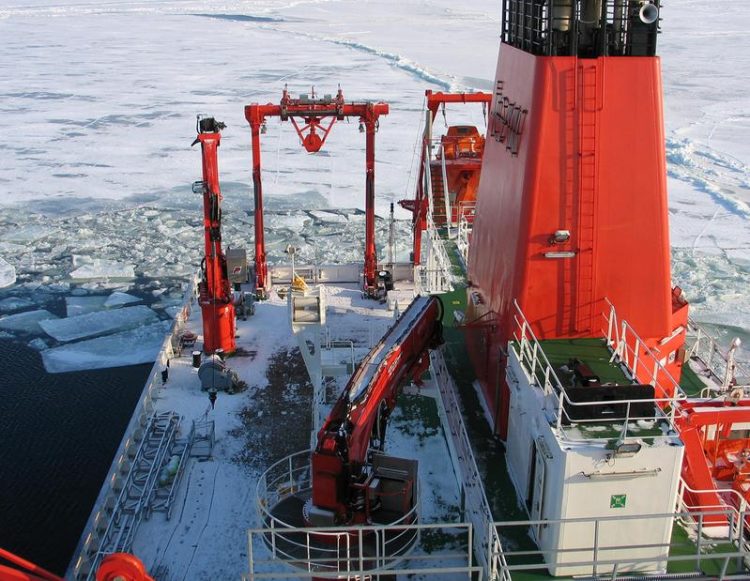Uncharted territory: 50th MERIAN expedition focuses on seafloor processes in winter

The 50th MERIAN expedition focuses on the study of winter conditions just like the RV's maiden voyage 10 years ago in February 2006. IOW / Neutzling
12 of the 16 scientific participants are researchers from the Leibniz Institute for Baltic Sea Research Warnemünde (IOW); another 4 come from the Helmholtz-Zentrum Geesthacht – Centre for Materials and Coastal Research. The research cruise, which started in the port of Bremerhaven and ends in Rostock Port on January 29, 2016, is headed by chief scientist and IOW director Prof. Dr. Ulrich Bathmann.
“For almost three years we have been intensively researching the seafloor of the North and Baltic Sea, its different habitats and their respec-tive ecosystem services within the KüNO programme. What happens down there in winter, however, is largely unknown,” the institute director explains the research focus of the MERIAN expedition.
Yet, adequate modelling of the processes in the sediment water transi-tion zone, which is especially active with regards to marine matter cycles, requires a com-plete set of seasonal data, Bathmann continues. “Winter is not the easiest season to embark on a research cruise, but our scientists are well prepared in every respect,” he adds.
The expedition’s scientific program includes an extensive sampling campaign at 30 stations in the North and Baltic Sea as well as in the Skagerrak / Kattegat strait that connects the two seas. Seafloor samples will be analysed with regards to sediment properties as well as to the presence and activity of zoobenthos populations during winter conditions as bioturbation plays a crucial role in sediment mixing and matter exchange between water and seabed.
This concerns important ecological factors such as oxygen, hydrogen sulfide, or nitrous oxide, as well as organic and inorganic particulate matter sedimenting from the water column. Furthermore, sediment cores will be examined for their content of heavy metals, microplastic particles and organic pollutants; experiments directly on board will be conducted to determine, whether microbial activity contributes to the bioavailability of these harmful substances also under winter conditions.
Physical effects on sediment resuspension by small-scale turbulences as a crucial component of sediment transport processes that enable the release of nutrients and other substances into the water column are monitored with vessel-mounted current profilers and a shear microstructure profiler. Specialized sea bottom landers will be deployed for the in-situ analysis of near-bottom turbulence and suspended particulate matter.
The investigations in the boundary layer of water to sediment will complemented with the classical repertoire of oceanographic analyses of the upper water column at all cruise stations to study the effect of the winter conditions on the deep water environments.
“The ultimate objective of the KüNO research on sediments in the North and Baltic Sea is to develop an atlas for the coastal region that provides a functional assessment of the different sediment provinces and habitats in terms of their ecological service for the coastal ecosystems as a basis for a sustainable management that protects especially important areas,” Ulrich Bathmann explains.
“We believe that our winter expedition, which is the last practical step of this phase in our sediment research, will provide significant progress in the understanding of matter cycle processes at the seafloor. Our findings therefore will be a valuable input for the KüNO sediment/habitat atlas,” the chief scientist concludes on the scientific programme of the current MERIAN cruise.
*Scientific contact:
Prof. Dr. Ulrich Bathmann | IOW Director | chiefscientist@merian.briese-research.de
*Further information on the research consortium “Küstenforschung Nordsee-Ostsee” (KüNO) with the projects “SECOS” and “NOAH” for characterizing sediments and habitats in the North and Baltic Sea: http://www.deutsche-kuestenforschung.de/home.html
*Press and Public Relations at IOW:
Dr. Kristin Beck | Phone: +49 (0)381 – 5197 135 | kristin.beck@io-warnemuende.de
Dr. Barbara Hentzsch | Phone: +49 (0)381 – 5197 102 | barbara.hentzsch@io-warnemuende.de
The IOW is a member of the Leibniz Association with currently 89 research institutes and scientific infrastructure facilities. The focus of the Leibniz Institutes ranges from natural, engineering and environmental sciences to economic, social and space sciences as well as to the humanities. The institutes are jointly financed at the state and national levels. The Leibniz Institutes employ a total of 18.100 people, of whom 9.200 are scientists. The total budget of the institutes is 1.64 billion Euros. (http://www.leibniz-association.eu)
Media Contact
All latest news from the category: Earth Sciences
Earth Sciences (also referred to as Geosciences), which deals with basic issues surrounding our planet, plays a vital role in the area of energy and raw materials supply.
Earth Sciences comprises subjects such as geology, geography, geological informatics, paleontology, mineralogy, petrography, crystallography, geophysics, geodesy, glaciology, cartography, photogrammetry, meteorology and seismology, early-warning systems, earthquake research and polar research.
Newest articles

NASA: Mystery of life’s handedness deepens
The mystery of why life uses molecules with specific orientations has deepened with a NASA-funded discovery that RNA — a key molecule thought to have potentially held the instructions for…

What are the effects of historic lithium mining on water quality?
Study reveals low levels of common contaminants but high levels of other elements in waters associated with an abandoned lithium mine. Lithium ore and mining waste from a historic lithium…

Quantum-inspired design boosts efficiency of heat-to-electricity conversion
Rice engineers take unconventional route to improving thermophotovoltaic systems. Researchers at Rice University have found a new way to improve a key element of thermophotovoltaic (TPV) systems, which convert heat…



